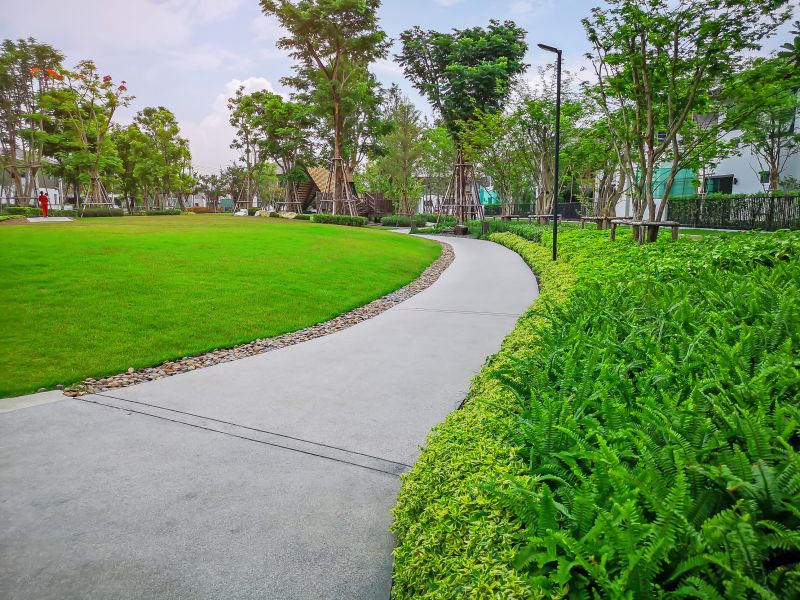Top Products For Outdoor Walkway Constructions Options
Explore the leading materials and tools to build durable, safe, and attractive outdoor walkways for any project size.
 Creating durable and visually appealing outdoor walkways involves selecting the right materials and products to suit various design preferences and functional needs. From residential pathways to commercial landscaping, the choice of walkway construction products can significantly influence the overall aesthetic and longevity of the outdoor space. Commonly used materials include pavers, concrete slabs, stepping stones, and gravel, each offering unique advantages in terms of installation, maintenance, and visual appeal.
Creating durable and visually appealing outdoor walkways involves selecting the right materials and products to suit various design preferences and functional needs. From residential pathways to commercial landscaping, the choice of walkway construction products can significantly influence the overall aesthetic and longevity of the outdoor space. Commonly used materials include pavers, concrete slabs, stepping stones, and gravel, each offering unique advantages in terms of installation, maintenance, and visual appeal.
Top Overall Option
Interlocking Paver System
Interlocking paver systems are versatile and adaptable, offering a wide range of colors, shapes, and sizes to suit various design preferences. They are designed for easy installation and can be adjusted or replaced with minimal disruption. Their modular nature allows for flexibility in creating intricate patterns or straightforward pathways, making them a popular choice for many outdoor walkway projects.
Types of Products For Outdoor Walkway Constructions
Concrete Pavers
Precast concrete pavers provide durability and a variety of design options, suitable for both residential and commercial pathways.
Natural Stone Slabs
Natural stone offers an authentic, timeless look with materials like flagstone, slate, or limestone, ideal for rustic or elegant pathways.
Brick Pavers
Traditional brick pavers create a classic aesthetic and are available in various colors and patterns for personalized designs.
Gravel and Crushed Stone
Gravel provides a permeable and cost-effective option, easy to install and maintain for informal or rustic walkways.
Stamped Concrete
Stamped concrete mimics the appearance of stone, brick, or tile, offering a durable and customizable surface.
Stepping Stones
Individual stepping stones can create a natural, informal pathway, often used in garden or landscape designs.
Wooden Decking
Wooden planks or composite decking materials can be used for walkways, adding warmth and a natural feel to outdoor spaces.
Rubber Pavers
Rubber pavers are slip-resistant and shock-absorbent, suitable for areas requiring extra safety features.
Permeable Pavers
Designed to allow water to pass through, permeable pavers help manage runoff and reduce pooling issues.
Composite Materials
Composite walkway products combine durability with low maintenance, suitable for high-traffic areas.
Decorative Gravel
Colorful and textured gravel options add visual interest and can be used with edging for a defined pathway.
Landscape Edging
Edging materials like metal, plastic, or stone help define walkway boundaries and prevent spreading of adjacent materials.
Lighting Fixtures
Pathway lighting enhances safety and aesthetics, with options ranging from solar-powered to wired fixtures.
Drainage Products
Drainage mats and pipe systems ensure proper water flow beneath walkways, preventing pooling and erosion.
Sealer and Sealant
Protective sealers extend the lifespan of walkway surfaces and enhance color vibrancy.
Popular Choices
A widely used material for its durability and design flexibility, suitable for various outdoor settings.
Popular for its natural look and slip resistance, often chosen for garden paths and patios.
Classic and versatile, brick pavers are favored for their timeless aesthetic and pattern options.
Cost-effective and easy to install, gravel is a common choice for informal walkways.
Offers a customizable surface that can mimic more expensive materials with a durable finish.
Ideal for creating a natural and inviting garden path with minimal installation effort.
Provides a warm, rustic look, often used in garden or backyard walkways.
Popular for managing water runoff while providing a stable walking surface.
Enhances visual appeal and is used in combination with edging or plants.
Adding lighting improves safety and ambiance for outdoor pathways.
Essential for ensuring proper water flow and preventing erosion around walkways.
Help protect surfaces from weathering and staining, extending the lifespan of walkway materials.
Proper installation of walkway products is essential to ensure stability and safety. Many products come with specific installation guidelines, such as base preparation, joint filling, and sealing, which can impact the lifespan of the walkway. Additionally, considerations like slip resistance, drainage, and color durability are important factors to evaluate when selecting products for outdoor walkway construction.
Innovative products and variations are available to meet diverse needs, whether for creating a rustic garden path or a sleek modern walkway. Accessories such as edging, lighting, and decorative aggregates can enhance both functionality and aesthetics. It's also important to consider how the chosen materials will integrate with existing landscaping features and the overall design theme of the outdoor space.
Choosing the right products for outdoor walkway construction requires a balance of durability, visual appeal, ease of installation, and cost. By understanding the different types of products available and their specific applications, homeowners and contractors can make informed decisions that result in beautiful, long-lasting pathways that complement their outdoor environments.
Key Buying Considerations
- Durability of the material to withstand foot traffic and weather conditions.
- Slip resistance features for safety, especially in wet conditions.
- Ease of installation and whether professional help is needed.
- Maintenance requirements for cleaning and repairs.
- Aesthetic compatibility with existing landscape and design theme.
- Drainage capabilities to prevent pooling or erosion.
- Availability of color options and pattern versatility.
- Cost-effectiveness over the lifespan of the walkway.
- Compatibility with surrounding landscape features.
- Environmental factors like frost resistance or UV stability.
- Edge stability and whether edging materials are needed.
- Impact of foot traffic volume on material choice.
- Potential for expansion or future modifications.
- Sealing or protective treatments needed for longevity.
- Availability of warranties or guarantees from suppliers.
